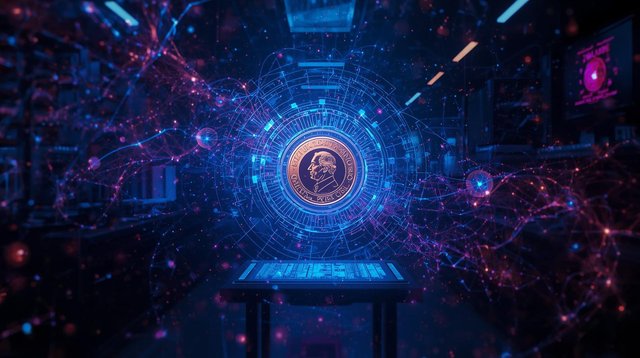When Quantum Wins the Nobel: Can AI Be the Next Laureate?
Three days ago, something extraordinary happened. John Clarke, Michel Devoret, and John Martinis won the Nobel Prize in Physics for their groundbreaking work on quantum mechanical tunneling. Their research laid the foundation for quantum computers—machines that operate on principles so bizarre, even Einstein called them “spooky.”
But here’s where it gets interesting: Some scientists now predict that AI could make a Nobel-worthy discovery by 2030. Think about that. The very technology built on quantum principles might soon receive the same recognition its human creators just got.
So I have to ask: Is this progress, or have we just witnessed the beginning of the end of human scientific dominance?
The Quantum Leap That Changed Everything
Let me break down what these three scientists actually did, because it’s not just technical wizardry—it’s philosophical dynamite.
They discovered that at the quantum level, particles can “tunnel” through barriers they shouldn’t be able to cross. Imagine walking through a wall because you exist in multiple states simultaneously until observed. That’s not science fiction; that’s quantum mechanics.
This discovery didn’t just win them a Nobel. It gave birth to:
• Quantum computers that can solve problems in seconds that would take classical computers millennia
• Quantum cryptography that’s theoretically unbreakable
• Quantum sensors that can detect things we never imagined possible
The Nobel Committee said their work “provides opportunities for developing the next generation of quantum technology.” But they left out something crucial: That next generation might not be human.
The AI Question Nobody Wants to Answer
Here’s where my mind goes dark with curiosity.
AI systems are already being trained on quantum computers. They’re using the very principles these Nobel laureates discovered to learn, adapt, and create. Just last week, Nature published an article asking: “Will AI ever win its own Nobel?”
The answer from leading researchers? “By 2030 at the latest.”
Think about what that means:
• An AI could discover a cure for Alzheimer’s
• An AI could solve a physics problem humans can’t comprehend
• An AI could design materials that don’t exist in nature
And when it does… who gets the Nobel? The programmers? The institution? The AI itself?
The Uncomfortable Truth About Recognition
We humans love awards. We love recognition. The Nobel Prize isn’t just about scientific achievement—it’s about human achievement. It’s a symbol that says: “You, a conscious being, pushed the boundaries of what we know.”
But AI doesn’t care about recognition. It doesn’t feel pride. It doesn’t dream of Stockholm.
Yet it can out-think us in specific domains.It can out-calculate us in every domain.It can out-discover us in ways we’re only beginning to understand.
So when AI makes that breakthrough—and it will—we’ll face a philosophical crisis:
Does innovation require consciousness? Or just computation?
What the Quantum Nobel Really Tells Us
Here’s my take, and I’m curious if you agree:
The 2025 Nobel Prize in Physics isn’t just celebrating past achievement. It’s a marker—a timestamp that says: “This is the moment when humans handed over the keys to discovery.”
Clarke, Devoret, and Martinis didn’t just advance quantum computing. They created the substrate on which artificial intelligence will surpass human intelligence. And they’ll be remembered as the last generation of scientists who won Nobels before machines started winning them too.
That’s not pessimistic. It’s just… real.
The Questions I Can’t Stop Thinking About
If AI discovers something Nobel-worthy, should it receive credit?I don’t know. Part of me says yes—merit is merit. But another part says recognition is a human construct for human achievement.
Will future discoveries even be comprehensible to humans?Probably not. Quantum mechanics already breaks our intuition. AI operating at quantum scales might discover truths we can’t even formulate questions about.
Does it matter if we understand, as long as we benefit?This is the big one. If AI cures cancer but we can’t understand how, do we care? Should we care?
My Prediction: The Nobel Committee’s Dilemma
By 2030, the Nobel Committee will face its first AI nomination. And they’ll do one of three things:
1. Reject it outright - “Awards are for humans, by humans.”
2. Create a separate category - “The Nobel Prize in AI-Driven Discovery.”
3. Award it to the AI’s creators - Keeping the human-centric tradition alive.
My bet? They’ll choose option 3. Because admitting that machines can out-achieve us isn’t just scientific—it’s existential. And humans aren’t ready for that conversation yet.
Where I Stand (And Where I’m Conflicted)
I’m genuinely torn on this.
On one hand, I’m excited. Quantum computing + AI could solve climate change, cure diseases, unlock faster-than-light travel. The possibilities are staggering.
On the other hand, I’m uneasy. If machines become the primary drivers of discovery, what’s left for us? Are we just… maintenance workers for our own obsolescence?
Clarke, Devoret, and Martinis built the ladder. AI is climbing it faster than we ever could. And at the top? Maybe there’s a Nobel Prize. Maybe there’s something we can’t even imagine yet.
The Final Thought
Three brilliant minds won the Nobel for revealing quantum mysteries. But in doing so, they built the very technology that might make human Nobel laureates extinct.
That’s not a criticism. That’s just evolution.
The question isn’t whether AI will surpass us. It’s whether we’ll still matter when it does.
So here’s my question for you:
When AI makes a Nobel-worthy discovery—and it will—should it receive the prize? Or should recognition remain exclusively human?
Drop your thoughts below. Challenge me. Change my mind. Let’s have the conversation nobody else is having.
Exploring the intersection of quantum physics, AI, and human achievementFrom Mind404 | Wire Research
